Report on Wider Professional Practice and Development in Education
VerifiedAdded on 2021/06/30
|12
|2571
|225
Report
AI Summary
This report delves into the multifaceted aspects of professional practice and development within the education and training sector. It begins by defining professionalism and dual professionalism, highlighting their significance in the field. The report then examines the professional values inherent in ESOL and literacy teaching, emphasizing the crucial role of continual professional development (CPD) in maintaining and enhancing teacher expertise. Furthermore, it explores the social, political, and economic factors that shape educational policy, providing insights into their impact on the sector. Finally, the report discusses the importance of organizational policies, codes of practice, and guidelines, illustrating how these elements contribute to a structured and effective learning environment. The document emphasizes the need for educators to adapt to changes and innovation, and it highlights how they must be familiar with policies and codes of conduct to promote excellence.
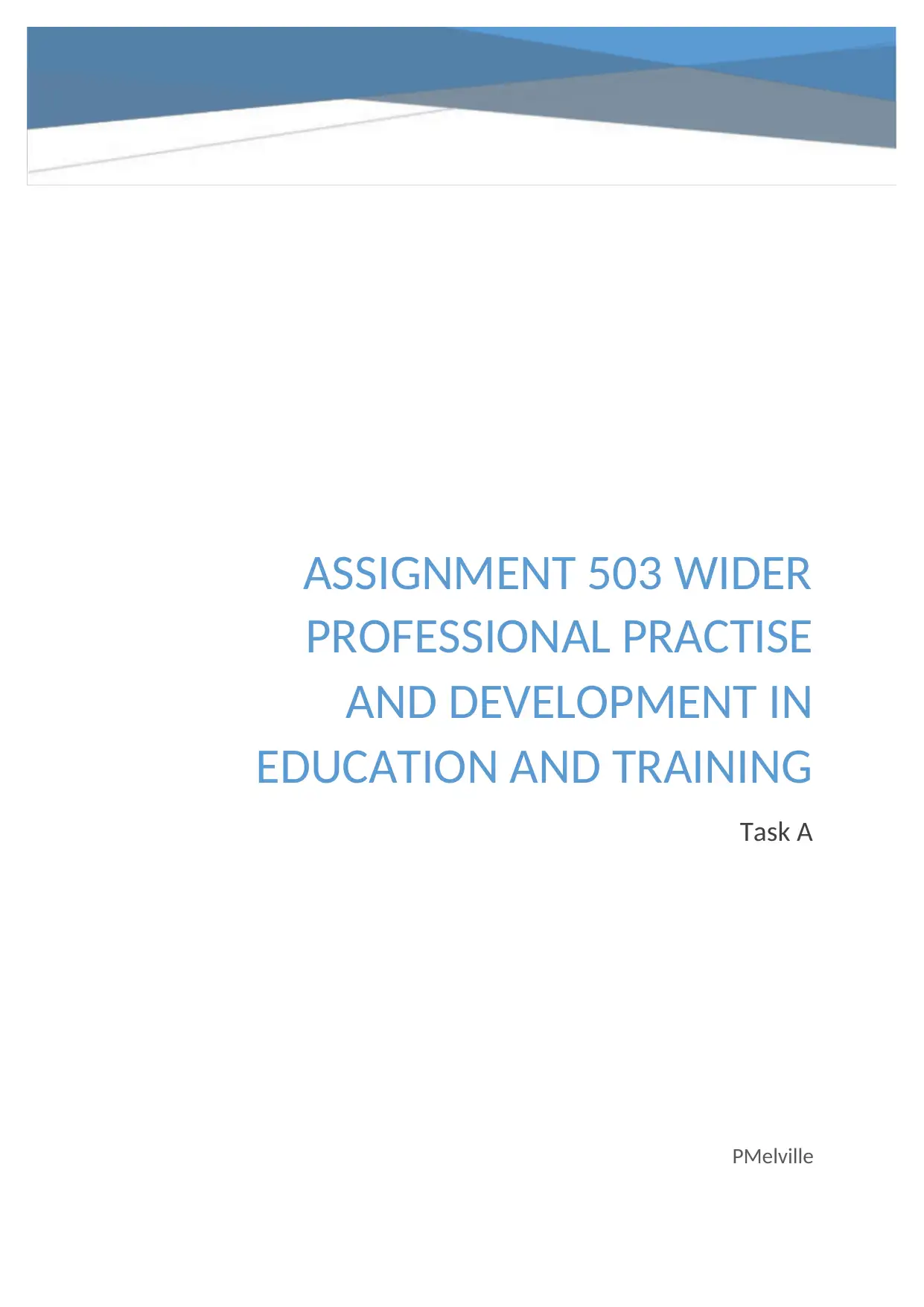
ASSIGNMENT 503 WIDER
PROFESSIONAL PRACTISE
AND DEVELOPMENT IN
EDUCATION AND TRAINING
Task A
PMelville
PROFESSIONAL PRACTISE
AND DEVELOPMENT IN
EDUCATION AND TRAINING
Task A
PMelville
Paraphrase This Document
Need a fresh take? Get an instant paraphrase of this document with our AI Paraphraser
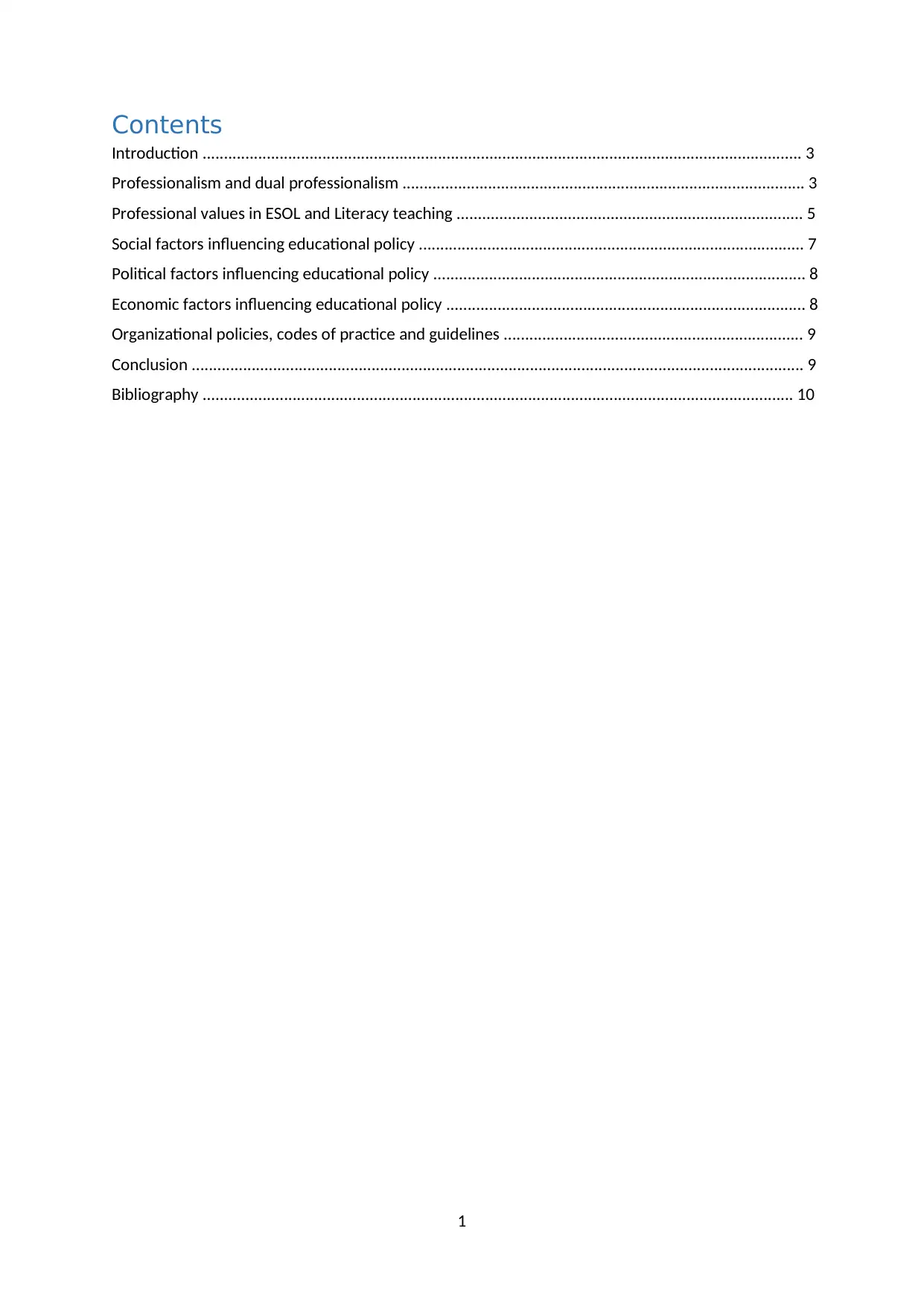
1
Contents
Introduction ............................................................................................................................................ 3
Professionalism and dual professionalism .............................................................................................. 3
Professional values in ESOL and Literacy teaching ................................................................................. 5
Social factors influencing educational policy .......................................................................................... 7
Political factors influencing educational policy ....................................................................................... 8
Economic factors influencing educational policy .................................................................................... 8
Organizational policies, codes of practice and guidelines ...................................................................... 9
Conclusion ............................................................................................................................................... 9
Bibliography .......................................................................................................................................... 10
Contents
Introduction ............................................................................................................................................ 3
Professionalism and dual professionalism .............................................................................................. 3
Professional values in ESOL and Literacy teaching ................................................................................. 5
Social factors influencing educational policy .......................................................................................... 7
Political factors influencing educational policy ....................................................................................... 8
Economic factors influencing educational policy .................................................................................... 8
Organizational policies, codes of practice and guidelines ...................................................................... 9
Conclusion ............................................................................................................................................... 9
Bibliography .......................................................................................................................................... 10

2
⊘ This is a preview!⊘
Do you want full access?
Subscribe today to unlock all pages.

Trusted by 1+ million students worldwide
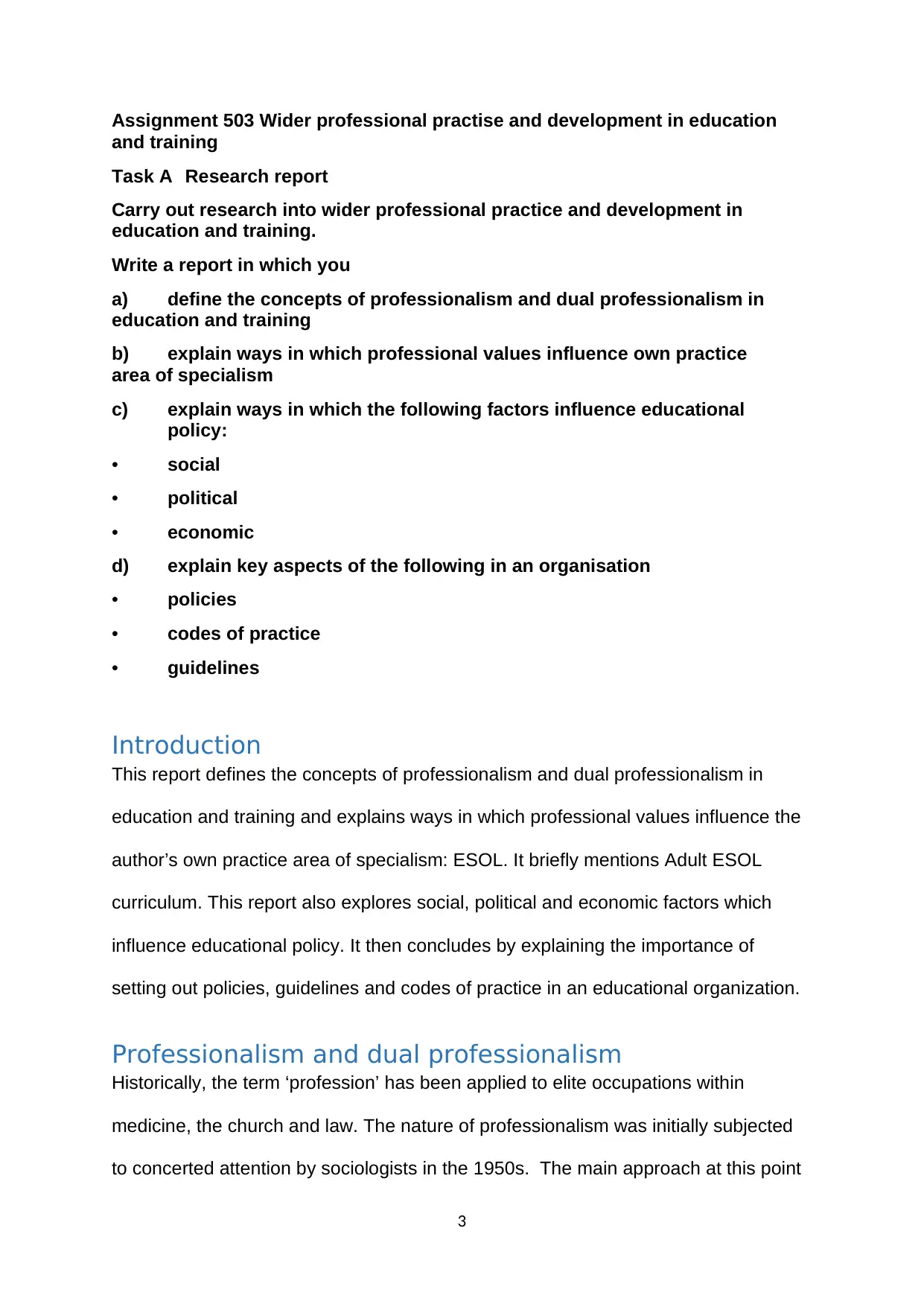
3
Assignment 503 Wider professional practise and development in education
and training
Task A Research report
Carry out research into wider professional practice and development in
education and training.
Write a report in which you
a) define the concepts of professionalism and dual professionalism in
education and training
b) explain ways in which professional values influence own practice
area of specialism
c) explain ways in which the following factors influence educational
policy:
• social
• political
• economic
d) explain key aspects of the following in an organisation
• policies
• codes of practice
• guidelines
Introduction
This report defines the concepts of professionalism and dual professionalism in
education and training and explains ways in which professional values influence the
author’s own practice area of specialism: ESOL. It briefly mentions Adult ESOL
curriculum. This report also explores social, political and economic factors which
influence educational policy. It then concludes by explaining the importance of
setting out policies, guidelines and codes of practice in an educational organization.
Professionalism and dual professionalism
Historically, the term ‘profession’ has been applied to elite occupations within
medicine, the church and law. The nature of professionalism was initially subjected
to concerted attention by sociologists in the 1950s. The main approach at this point
Assignment 503 Wider professional practise and development in education
and training
Task A Research report
Carry out research into wider professional practice and development in
education and training.
Write a report in which you
a) define the concepts of professionalism and dual professionalism in
education and training
b) explain ways in which professional values influence own practice
area of specialism
c) explain ways in which the following factors influence educational
policy:
• social
• political
• economic
d) explain key aspects of the following in an organisation
• policies
• codes of practice
• guidelines
Introduction
This report defines the concepts of professionalism and dual professionalism in
education and training and explains ways in which professional values influence the
author’s own practice area of specialism: ESOL. It briefly mentions Adult ESOL
curriculum. This report also explores social, political and economic factors which
influence educational policy. It then concludes by explaining the importance of
setting out policies, guidelines and codes of practice in an educational organization.
Professionalism and dual professionalism
Historically, the term ‘profession’ has been applied to elite occupations within
medicine, the church and law. The nature of professionalism was initially subjected
to concerted attention by sociologists in the 1950s. The main approach at this point
Paraphrase This Document
Need a fresh take? Get an instant paraphrase of this document with our AI Paraphraser
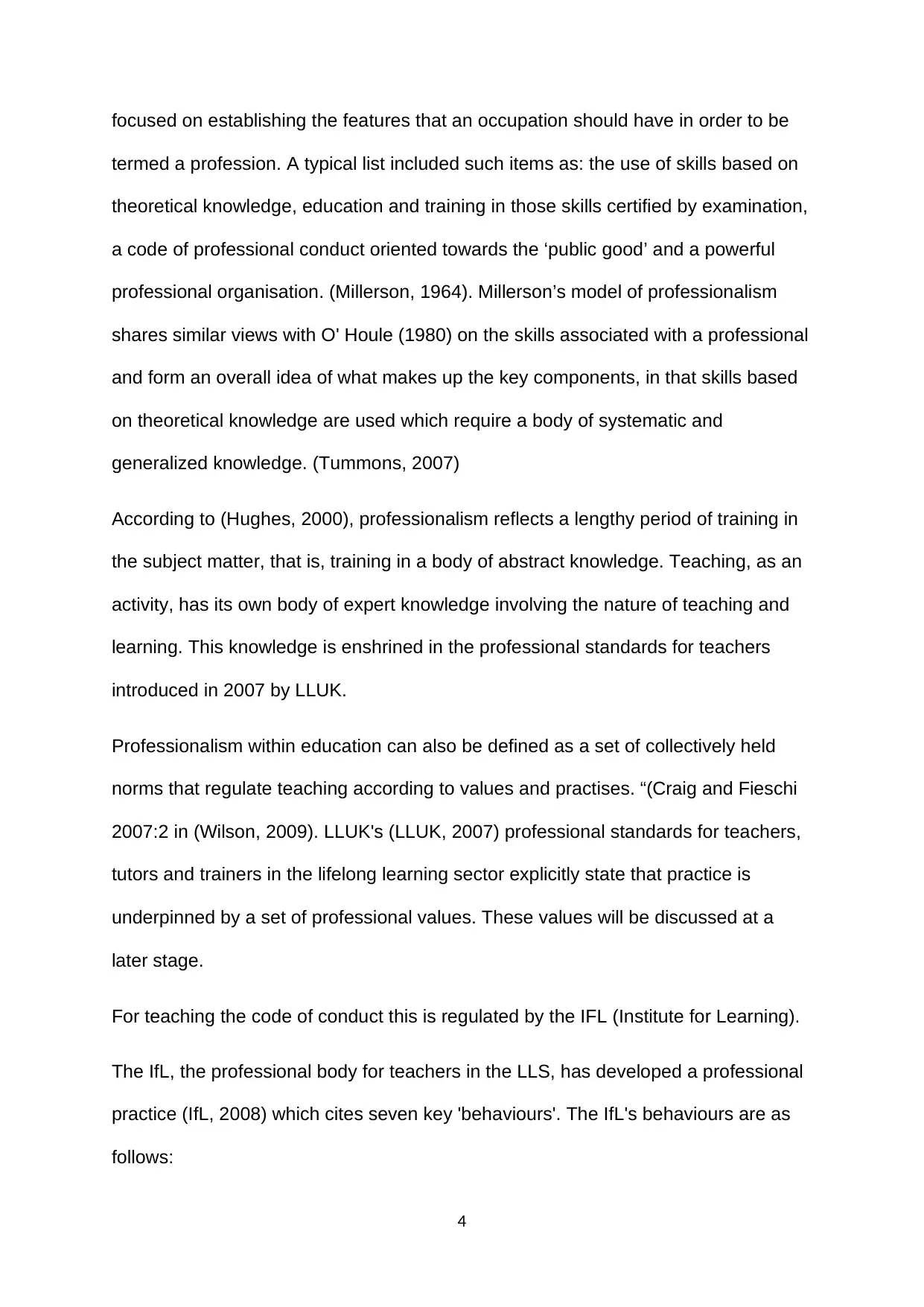
4
focused on establishing the features that an occupation should have in order to be
termed a profession. A typical list included such items as: the use of skills based on
theoretical knowledge, education and training in those skills certified by examination,
a code of professional conduct oriented towards the ‘public good’ and a powerful
professional organisation. (Millerson, 1964). Millerson’s model of professionalism
shares similar views with O' Houle (1980) on the skills associated with a professional
and form an overall idea of what makes up the key components, in that skills based
on theoretical knowledge are used which require a body of systematic and
generalized knowledge. (Tummons, 2007)
According to (Hughes, 2000), professionalism reflects a lengthy period of training in
the subject matter, that is, training in a body of abstract knowledge. Teaching, as an
activity, has its own body of expert knowledge involving the nature of teaching and
learning. This knowledge is enshrined in the professional standards for teachers
introduced in 2007 by LLUK.
Professionalism within education can also be defined as a set of collectively held
norms that regulate teaching according to values and practises. “(Craig and Fieschi
2007:2 in (Wilson, 2009). LLUK's (LLUK, 2007) professional standards for teachers,
tutors and trainers in the lifelong learning sector explicitly state that practice is
underpinned by a set of professional values. These values will be discussed at a
later stage.
For teaching the code of conduct this is regulated by the IFL (Institute for Learning).
The IfL, the professional body for teachers in the LLS, has developed a professional
practice (IfL, 2008) which cites seven key 'behaviours'. The IfL's behaviours are as
follows:
focused on establishing the features that an occupation should have in order to be
termed a profession. A typical list included such items as: the use of skills based on
theoretical knowledge, education and training in those skills certified by examination,
a code of professional conduct oriented towards the ‘public good’ and a powerful
professional organisation. (Millerson, 1964). Millerson’s model of professionalism
shares similar views with O' Houle (1980) on the skills associated with a professional
and form an overall idea of what makes up the key components, in that skills based
on theoretical knowledge are used which require a body of systematic and
generalized knowledge. (Tummons, 2007)
According to (Hughes, 2000), professionalism reflects a lengthy period of training in
the subject matter, that is, training in a body of abstract knowledge. Teaching, as an
activity, has its own body of expert knowledge involving the nature of teaching and
learning. This knowledge is enshrined in the professional standards for teachers
introduced in 2007 by LLUK.
Professionalism within education can also be defined as a set of collectively held
norms that regulate teaching according to values and practises. “(Craig and Fieschi
2007:2 in (Wilson, 2009). LLUK's (LLUK, 2007) professional standards for teachers,
tutors and trainers in the lifelong learning sector explicitly state that practice is
underpinned by a set of professional values. These values will be discussed at a
later stage.
For teaching the code of conduct this is regulated by the IFL (Institute for Learning).
The IfL, the professional body for teachers in the LLS, has developed a professional
practice (IfL, 2008) which cites seven key 'behaviours'. The IfL's behaviours are as
follows:
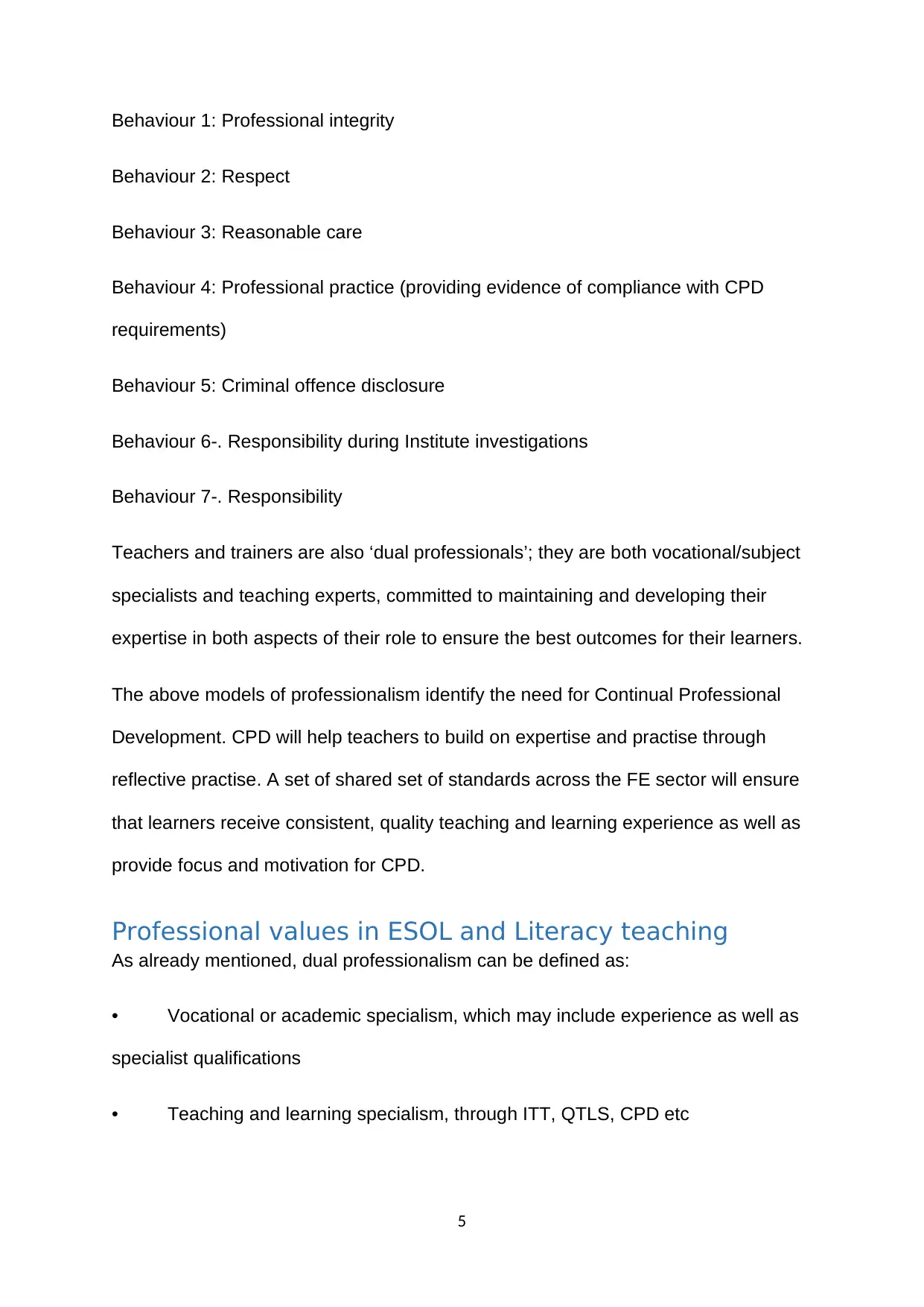
5
Behaviour 1: Professional integrity
Behaviour 2: Respect
Behaviour 3: Reasonable care
Behaviour 4: Professional practice (providing evidence of compliance with CPD
requirements)
Behaviour 5: Criminal offence disclosure
Behaviour 6-. Responsibility during Institute investigations
Behaviour 7-. Responsibility
Teachers and trainers are also ‘dual professionals’; they are both vocational/subject
specialists and teaching experts, committed to maintaining and developing their
expertise in both aspects of their role to ensure the best outcomes for their learners.
The above models of professionalism identify the need for Continual Professional
Development. CPD will help teachers to build on expertise and practise through
reflective practise. A set of shared set of standards across the FE sector will ensure
that learners receive consistent, quality teaching and learning experience as well as
provide focus and motivation for CPD.
Professional values in ESOL and Literacy teaching
As already mentioned, dual professionalism can be defined as:
• Vocational or academic specialism, which may include experience as well as
specialist qualifications
• Teaching and learning specialism, through ITT, QTLS, CPD etc
Behaviour 1: Professional integrity
Behaviour 2: Respect
Behaviour 3: Reasonable care
Behaviour 4: Professional practice (providing evidence of compliance with CPD
requirements)
Behaviour 5: Criminal offence disclosure
Behaviour 6-. Responsibility during Institute investigations
Behaviour 7-. Responsibility
Teachers and trainers are also ‘dual professionals’; they are both vocational/subject
specialists and teaching experts, committed to maintaining and developing their
expertise in both aspects of their role to ensure the best outcomes for their learners.
The above models of professionalism identify the need for Continual Professional
Development. CPD will help teachers to build on expertise and practise through
reflective practise. A set of shared set of standards across the FE sector will ensure
that learners receive consistent, quality teaching and learning experience as well as
provide focus and motivation for CPD.
Professional values in ESOL and Literacy teaching
As already mentioned, dual professionalism can be defined as:
• Vocational or academic specialism, which may include experience as well as
specialist qualifications
• Teaching and learning specialism, through ITT, QTLS, CPD etc
⊘ This is a preview!⊘
Do you want full access?
Subscribe today to unlock all pages.

Trusted by 1+ million students worldwide
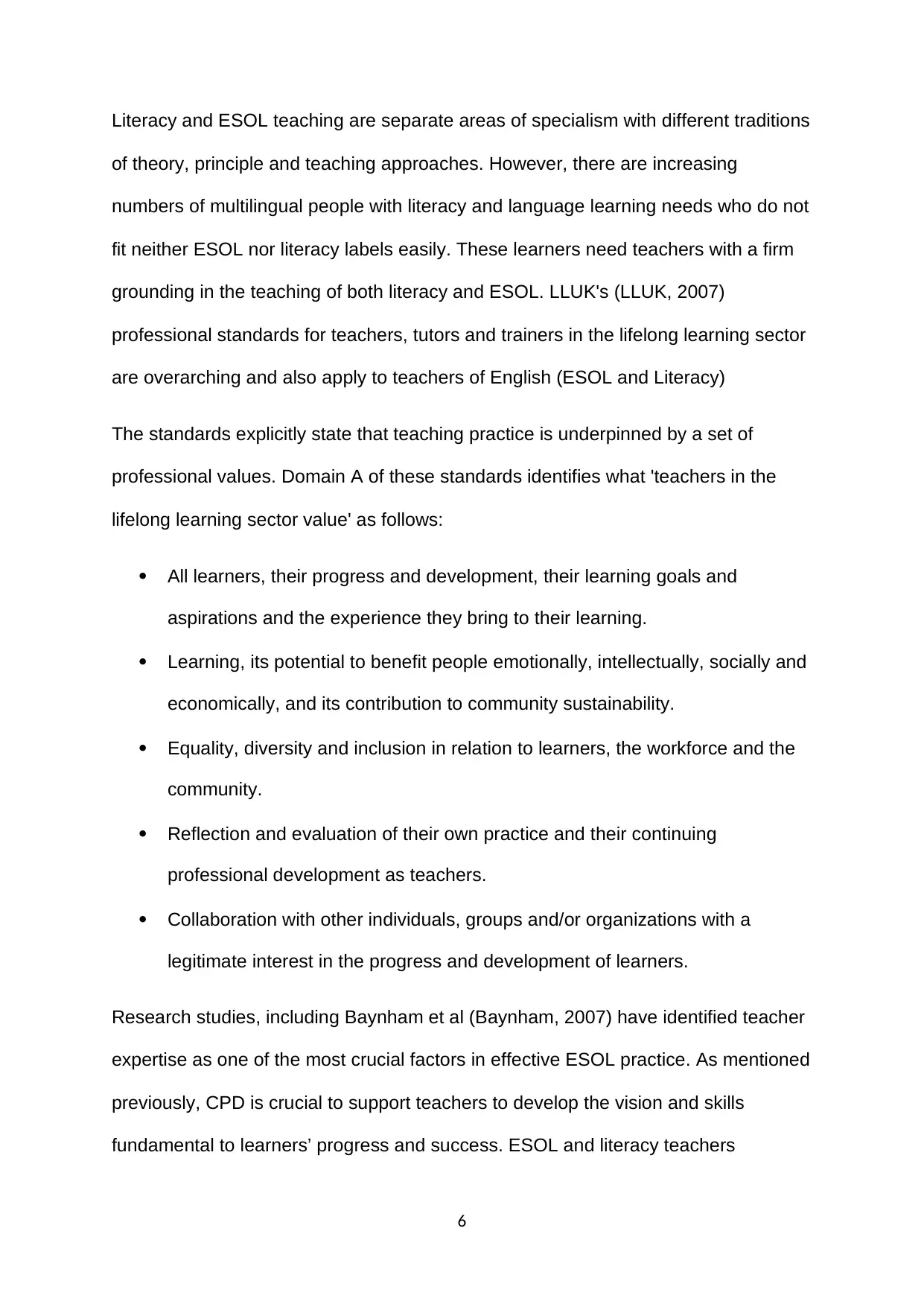
6
Literacy and ESOL teaching are separate areas of specialism with different traditions
of theory, principle and teaching approaches. However, there are increasing
numbers of multilingual people with literacy and language learning needs who do not
fit neither ESOL nor literacy labels easily. These learners need teachers with a firm
grounding in the teaching of both literacy and ESOL. LLUK's (LLUK, 2007)
professional standards for teachers, tutors and trainers in the lifelong learning sector
are overarching and also apply to teachers of English (ESOL and Literacy)
The standards explicitly state that teaching practice is underpinned by a set of
professional values. Domain A of these standards identifies what 'teachers in the
lifelong learning sector value' as follows:
All learners, their progress and development, their learning goals and
aspirations and the experience they bring to their learning.
Learning, its potential to benefit people emotionally, intellectually, socially and
economically, and its contribution to community sustainability.
Equality, diversity and inclusion in relation to learners, the workforce and the
community.
Reflection and evaluation of their own practice and their continuing
professional development as teachers.
Collaboration with other individuals, groups and/or organizations with a
legitimate interest in the progress and development of learners.
Research studies, including Baynham et al (Baynham, 2007) have identified teacher
expertise as one of the most crucial factors in effective ESOL practice. As mentioned
previously, CPD is crucial to support teachers to develop the vision and skills
fundamental to learners’ progress and success. ESOL and literacy teachers
Literacy and ESOL teaching are separate areas of specialism with different traditions
of theory, principle and teaching approaches. However, there are increasing
numbers of multilingual people with literacy and language learning needs who do not
fit neither ESOL nor literacy labels easily. These learners need teachers with a firm
grounding in the teaching of both literacy and ESOL. LLUK's (LLUK, 2007)
professional standards for teachers, tutors and trainers in the lifelong learning sector
are overarching and also apply to teachers of English (ESOL and Literacy)
The standards explicitly state that teaching practice is underpinned by a set of
professional values. Domain A of these standards identifies what 'teachers in the
lifelong learning sector value' as follows:
All learners, their progress and development, their learning goals and
aspirations and the experience they bring to their learning.
Learning, its potential to benefit people emotionally, intellectually, socially and
economically, and its contribution to community sustainability.
Equality, diversity and inclusion in relation to learners, the workforce and the
community.
Reflection and evaluation of their own practice and their continuing
professional development as teachers.
Collaboration with other individuals, groups and/or organizations with a
legitimate interest in the progress and development of learners.
Research studies, including Baynham et al (Baynham, 2007) have identified teacher
expertise as one of the most crucial factors in effective ESOL practice. As mentioned
previously, CPD is crucial to support teachers to develop the vision and skills
fundamental to learners’ progress and success. ESOL and literacy teachers
Paraphrase This Document
Need a fresh take? Get an instant paraphrase of this document with our AI Paraphraser
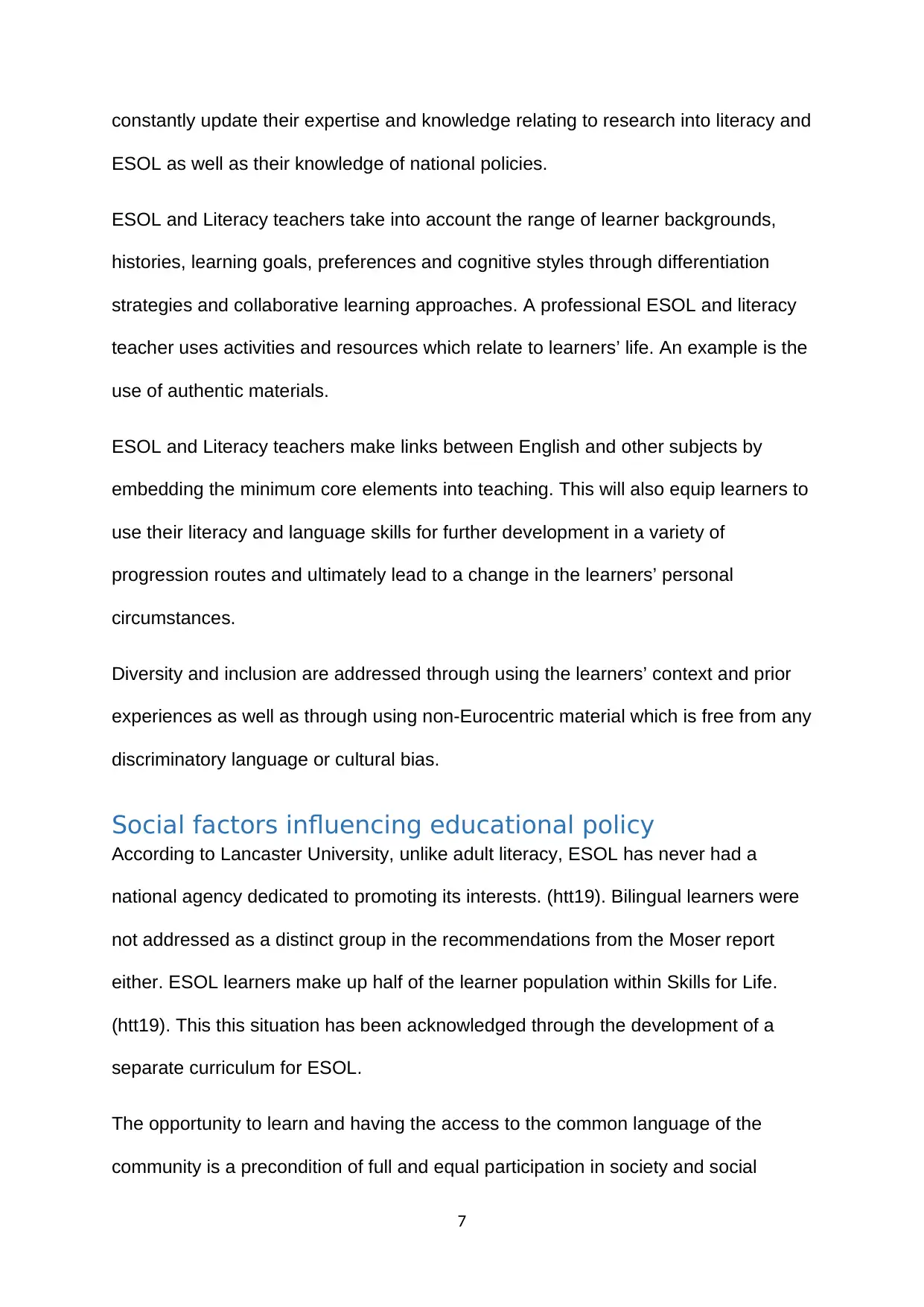
7
constantly update their expertise and knowledge relating to research into literacy and
ESOL as well as their knowledge of national policies.
ESOL and Literacy teachers take into account the range of learner backgrounds,
histories, learning goals, preferences and cognitive styles through differentiation
strategies and collaborative learning approaches. A professional ESOL and literacy
teacher uses activities and resources which relate to learners’ life. An example is the
use of authentic materials.
ESOL and Literacy teachers make links between English and other subjects by
embedding the minimum core elements into teaching. This will also equip learners to
use their literacy and language skills for further development in a variety of
progression routes and ultimately lead to a change in the learners’ personal
circumstances.
Diversity and inclusion are addressed through using the learners’ context and prior
experiences as well as through using non-Eurocentric material which is free from any
discriminatory language or cultural bias.
Social factors influencing educational policy
According to Lancaster University, unlike adult literacy, ESOL has never had a
national agency dedicated to promoting its interests. (htt19). Bilingual learners were
not addressed as a distinct group in the recommendations from the Moser report
either. ESOL learners make up half of the learner population within Skills for Life.
(htt19). This this situation has been acknowledged through the development of a
separate curriculum for ESOL.
The opportunity to learn and having the access to the common language of the
community is a precondition of full and equal participation in society and social
constantly update their expertise and knowledge relating to research into literacy and
ESOL as well as their knowledge of national policies.
ESOL and Literacy teachers take into account the range of learner backgrounds,
histories, learning goals, preferences and cognitive styles through differentiation
strategies and collaborative learning approaches. A professional ESOL and literacy
teacher uses activities and resources which relate to learners’ life. An example is the
use of authentic materials.
ESOL and Literacy teachers make links between English and other subjects by
embedding the minimum core elements into teaching. This will also equip learners to
use their literacy and language skills for further development in a variety of
progression routes and ultimately lead to a change in the learners’ personal
circumstances.
Diversity and inclusion are addressed through using the learners’ context and prior
experiences as well as through using non-Eurocentric material which is free from any
discriminatory language or cultural bias.
Social factors influencing educational policy
According to Lancaster University, unlike adult literacy, ESOL has never had a
national agency dedicated to promoting its interests. (htt19). Bilingual learners were
not addressed as a distinct group in the recommendations from the Moser report
either. ESOL learners make up half of the learner population within Skills for Life.
(htt19). This this situation has been acknowledged through the development of a
separate curriculum for ESOL.
The opportunity to learn and having the access to the common language of the
community is a precondition of full and equal participation in society and social
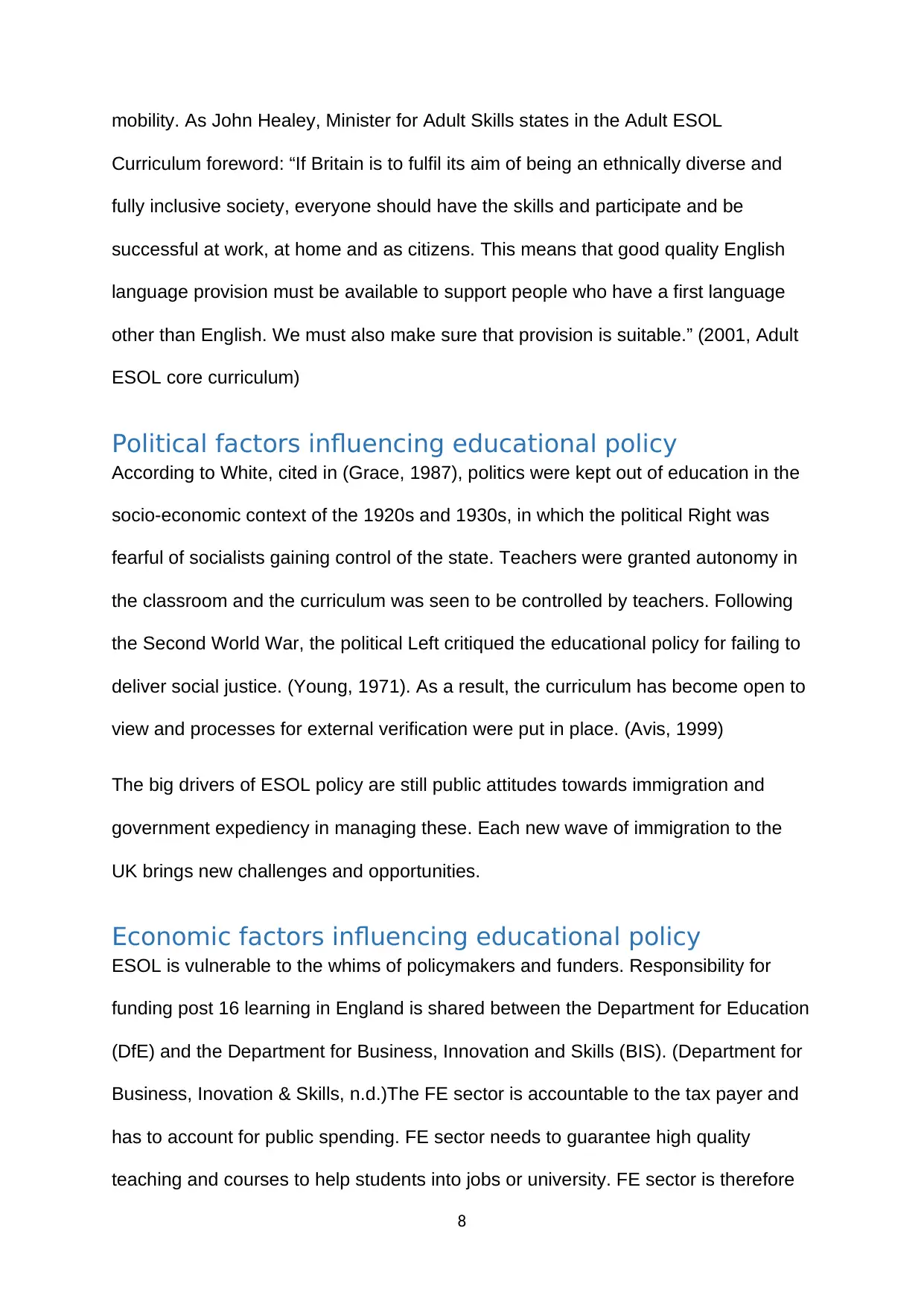
8
mobility. As John Healey, Minister for Adult Skills states in the Adult ESOL
Curriculum foreword: “If Britain is to fulfil its aim of being an ethnically diverse and
fully inclusive society, everyone should have the skills and participate and be
successful at work, at home and as citizens. This means that good quality English
language provision must be available to support people who have a first language
other than English. We must also make sure that provision is suitable.” (2001, Adult
ESOL core curriculum)
Political factors influencing educational policy
According to White, cited in (Grace, 1987), politics were kept out of education in the
socio-economic context of the 1920s and 1930s, in which the political Right was
fearful of socialists gaining control of the state. Teachers were granted autonomy in
the classroom and the curriculum was seen to be controlled by teachers. Following
the Second World War, the political Left critiqued the educational policy for failing to
deliver social justice. (Young, 1971). As a result, the curriculum has become open to
view and processes for external verification were put in place. (Avis, 1999)
The big drivers of ESOL policy are still public attitudes towards immigration and
government expediency in managing these. Each new wave of immigration to the
UK brings new challenges and opportunities.
Economic factors influencing educational policy
ESOL is vulnerable to the whims of policymakers and funders. Responsibility for
funding post 16 learning in England is shared between the Department for Education
(DfE) and the Department for Business, Innovation and Skills (BIS). (Department for
Business, Inovation & Skills, n.d.)The FE sector is accountable to the tax payer and
has to account for public spending. FE sector needs to guarantee high quality
teaching and courses to help students into jobs or university. FE sector is therefore
mobility. As John Healey, Minister for Adult Skills states in the Adult ESOL
Curriculum foreword: “If Britain is to fulfil its aim of being an ethnically diverse and
fully inclusive society, everyone should have the skills and participate and be
successful at work, at home and as citizens. This means that good quality English
language provision must be available to support people who have a first language
other than English. We must also make sure that provision is suitable.” (2001, Adult
ESOL core curriculum)
Political factors influencing educational policy
According to White, cited in (Grace, 1987), politics were kept out of education in the
socio-economic context of the 1920s and 1930s, in which the political Right was
fearful of socialists gaining control of the state. Teachers were granted autonomy in
the classroom and the curriculum was seen to be controlled by teachers. Following
the Second World War, the political Left critiqued the educational policy for failing to
deliver social justice. (Young, 1971). As a result, the curriculum has become open to
view and processes for external verification were put in place. (Avis, 1999)
The big drivers of ESOL policy are still public attitudes towards immigration and
government expediency in managing these. Each new wave of immigration to the
UK brings new challenges and opportunities.
Economic factors influencing educational policy
ESOL is vulnerable to the whims of policymakers and funders. Responsibility for
funding post 16 learning in England is shared between the Department for Education
(DfE) and the Department for Business, Innovation and Skills (BIS). (Department for
Business, Inovation & Skills, n.d.)The FE sector is accountable to the tax payer and
has to account for public spending. FE sector needs to guarantee high quality
teaching and courses to help students into jobs or university. FE sector is therefore
⊘ This is a preview!⊘
Do you want full access?
Subscribe today to unlock all pages.

Trusted by 1+ million students worldwide
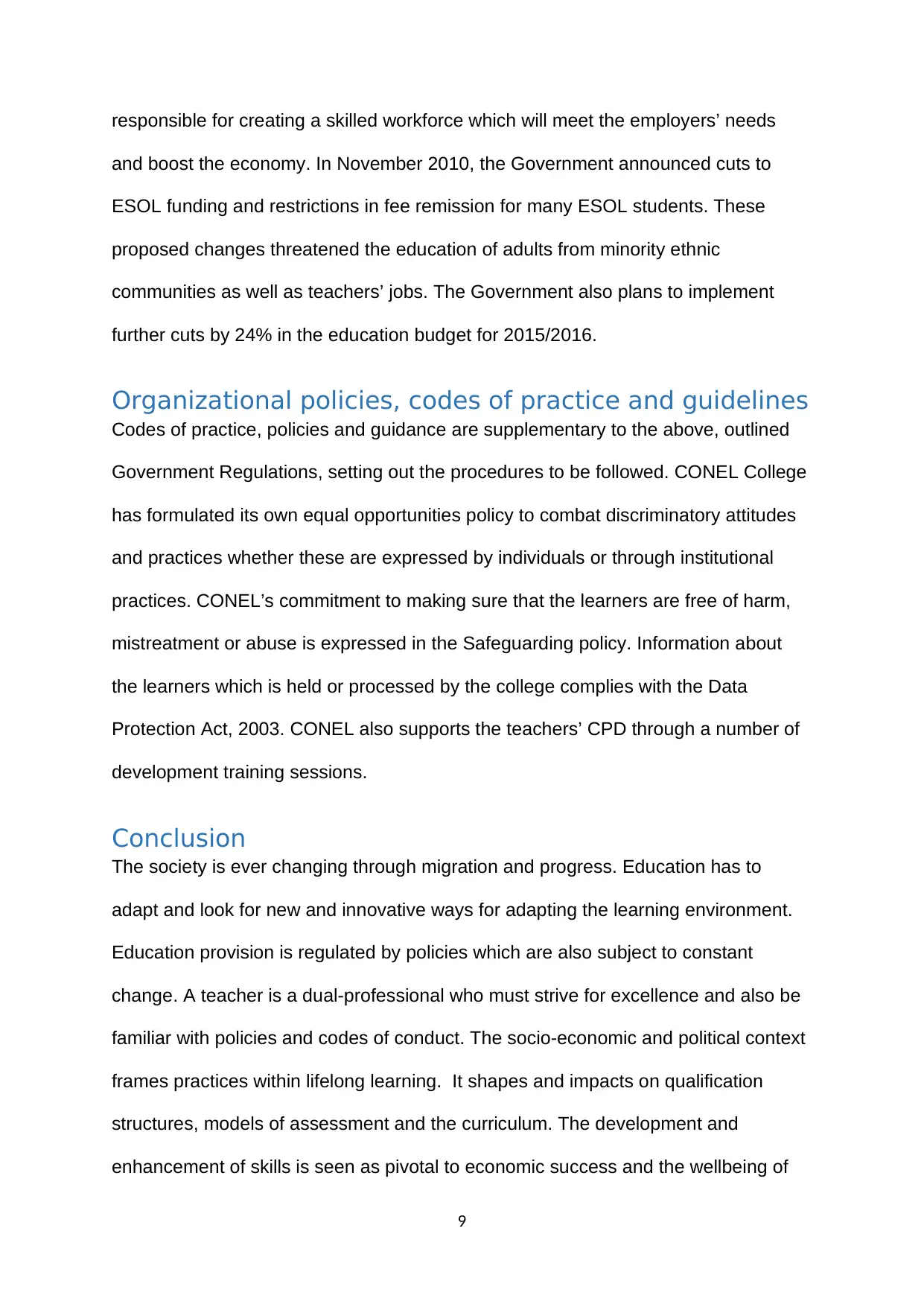
9
responsible for creating a skilled workforce which will meet the employers’ needs
and boost the economy. In November 2010, the Government announced cuts to
ESOL funding and restrictions in fee remission for many ESOL students. These
proposed changes threatened the education of adults from minority ethnic
communities as well as teachers’ jobs. The Government also plans to implement
further cuts by 24% in the education budget for 2015/2016.
Organizational policies, codes of practice and guidelines
Codes of practice, policies and guidance are supplementary to the above, outlined
Government Regulations, setting out the procedures to be followed. CONEL College
has formulated its own equal opportunities policy to combat discriminatory attitudes
and practices whether these are expressed by individuals or through institutional
practices. CONEL’s commitment to making sure that the learners are free of harm,
mistreatment or abuse is expressed in the Safeguarding policy. Information about
the learners which is held or processed by the college complies with the Data
Protection Act, 2003. CONEL also supports the teachers’ CPD through a number of
development training sessions.
Conclusion
The society is ever changing through migration and progress. Education has to
adapt and look for new and innovative ways for adapting the learning environment.
Education provision is regulated by policies which are also subject to constant
change. A teacher is a dual-professional who must strive for excellence and also be
familiar with policies and codes of conduct. The socio-economic and political context
frames practices within lifelong learning. It shapes and impacts on qualification
structures, models of assessment and the curriculum. The development and
enhancement of skills is seen as pivotal to economic success and the wellbeing of
responsible for creating a skilled workforce which will meet the employers’ needs
and boost the economy. In November 2010, the Government announced cuts to
ESOL funding and restrictions in fee remission for many ESOL students. These
proposed changes threatened the education of adults from minority ethnic
communities as well as teachers’ jobs. The Government also plans to implement
further cuts by 24% in the education budget for 2015/2016.
Organizational policies, codes of practice and guidelines
Codes of practice, policies and guidance are supplementary to the above, outlined
Government Regulations, setting out the procedures to be followed. CONEL College
has formulated its own equal opportunities policy to combat discriminatory attitudes
and practices whether these are expressed by individuals or through institutional
practices. CONEL’s commitment to making sure that the learners are free of harm,
mistreatment or abuse is expressed in the Safeguarding policy. Information about
the learners which is held or processed by the college complies with the Data
Protection Act, 2003. CONEL also supports the teachers’ CPD through a number of
development training sessions.
Conclusion
The society is ever changing through migration and progress. Education has to
adapt and look for new and innovative ways for adapting the learning environment.
Education provision is regulated by policies which are also subject to constant
change. A teacher is a dual-professional who must strive for excellence and also be
familiar with policies and codes of conduct. The socio-economic and political context
frames practices within lifelong learning. It shapes and impacts on qualification
structures, models of assessment and the curriculum. The development and
enhancement of skills is seen as pivotal to economic success and the wellbeing of
Paraphrase This Document
Need a fresh take? Get an instant paraphrase of this document with our AI Paraphraser
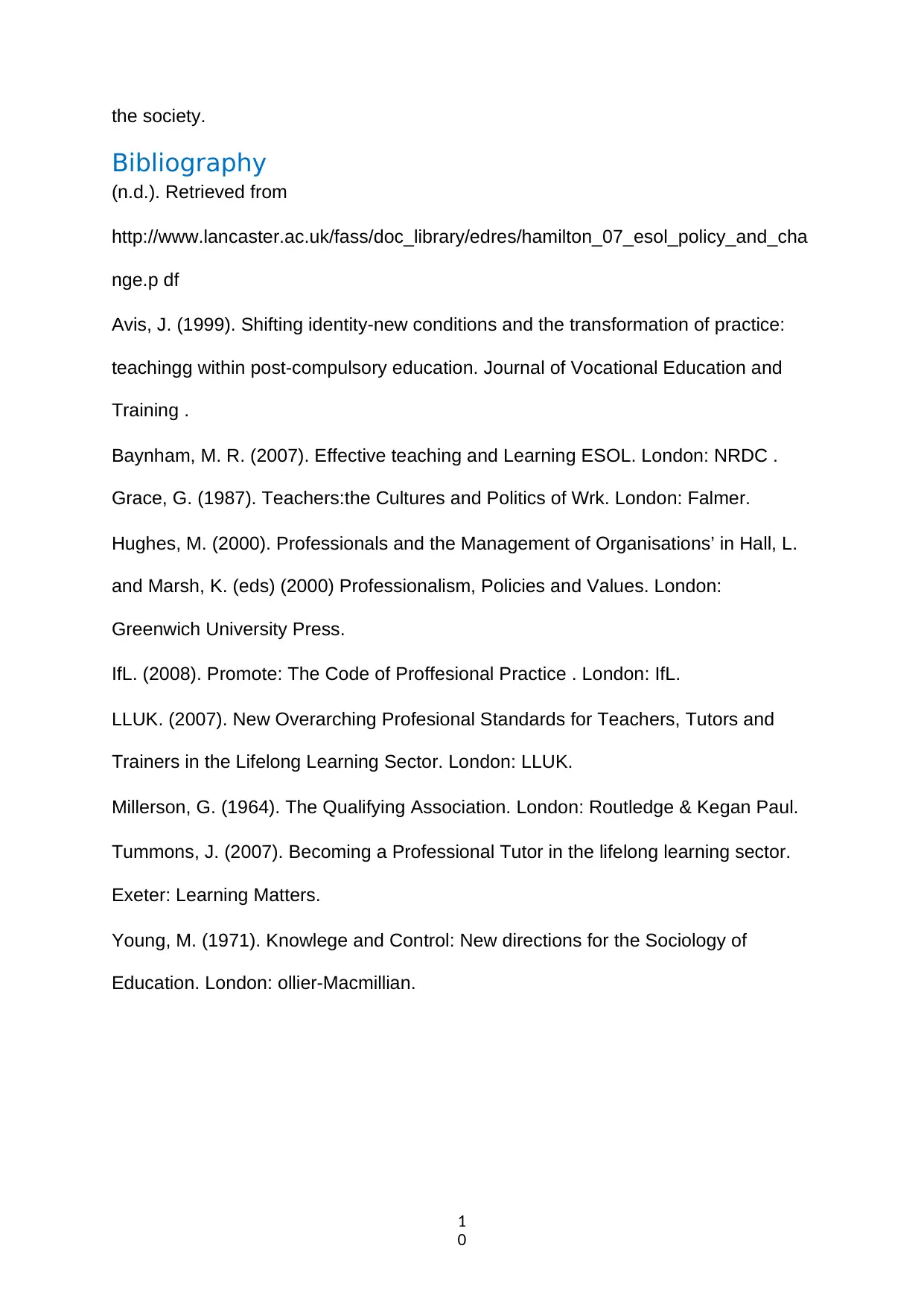
1
0
the society.
Bibliography
(n.d.). Retrieved from
http://www.lancaster.ac.uk/fass/doc_library/edres/hamilton_07_esol_policy_and_cha
nge.p df
Avis, J. (1999). Shifting identity-new conditions and the transformation of practice:
teachingg within post-compulsory education. Journal of Vocational Education and
Training .
Baynham, M. R. (2007). Effective teaching and Learning ESOL. London: NRDC .
Grace, G. (1987). Teachers:the Cultures and Politics of Wrk. London: Falmer.
Hughes, M. (2000). Professionals and the Management of Organisations’ in Hall, L.
and Marsh, K. (eds) (2000) Professionalism, Policies and Values. London:
Greenwich University Press.
IfL. (2008). Promote: The Code of Proffesional Practice . London: IfL.
LLUK. (2007). New Overarching Profesional Standards for Teachers, Tutors and
Trainers in the Lifelong Learning Sector. London: LLUK.
Millerson, G. (1964). The Qualifying Association. London: Routledge & Kegan Paul.
Tummons, J. (2007). Becoming a Professional Tutor in the lifelong learning sector.
Exeter: Learning Matters.
Young, M. (1971). Knowlege and Control: New directions for the Sociology of
Education. London: ollier-Macmillian.
0
the society.
Bibliography
(n.d.). Retrieved from
http://www.lancaster.ac.uk/fass/doc_library/edres/hamilton_07_esol_policy_and_cha
nge.p df
Avis, J. (1999). Shifting identity-new conditions and the transformation of practice:
teachingg within post-compulsory education. Journal of Vocational Education and
Training .
Baynham, M. R. (2007). Effective teaching and Learning ESOL. London: NRDC .
Grace, G. (1987). Teachers:the Cultures and Politics of Wrk. London: Falmer.
Hughes, M. (2000). Professionals and the Management of Organisations’ in Hall, L.
and Marsh, K. (eds) (2000) Professionalism, Policies and Values. London:
Greenwich University Press.
IfL. (2008). Promote: The Code of Proffesional Practice . London: IfL.
LLUK. (2007). New Overarching Profesional Standards for Teachers, Tutors and
Trainers in the Lifelong Learning Sector. London: LLUK.
Millerson, G. (1964). The Qualifying Association. London: Routledge & Kegan Paul.
Tummons, J. (2007). Becoming a Professional Tutor in the lifelong learning sector.
Exeter: Learning Matters.
Young, M. (1971). Knowlege and Control: New directions for the Sociology of
Education. London: ollier-Macmillian.

10
⊘ This is a preview!⊘
Do you want full access?
Subscribe today to unlock all pages.

Trusted by 1+ million students worldwide
1 out of 12
Related Documents
Your All-in-One AI-Powered Toolkit for Academic Success.
+13062052269
info@desklib.com
Available 24*7 on WhatsApp / Email
![[object Object]](/_next/static/media/star-bottom.7253800d.svg)
Unlock your academic potential
Copyright © 2020–2026 A2Z Services. All Rights Reserved. Developed and managed by ZUCOL.



